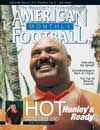Article CategoriesAFM Magazine
|
Two Hot to StopDespite the recent trend of hiring offensive coaches, McMackin and Hunley are future head coaches from the defensive side of the ballby: Richard Scott © More from this issue According to the old cliche, defense wins championships and offense sells tickets, so if the rising number of offensive-related hires in recent years tells us anything, it's that college presidents, athletic directors and major boosters doing the hiring must be more interested in selling tickets than winning championships. But what factor sells tickets more than winning championships? Just ask the folks at Oklahoma, where coach Bob Stoops and the Sooners are the hottest ticket West of the Mississippi. Did we happen to mention that Stoops was a defensive coordinator at Florida and Kansas State before he became a head coach for the first time two years ago? That fact didn't get past Texas Tech defensive coordinator Greg McMackin. Then again, not much gets past McMackin. Not in the film room, the staff room or on the football field. |
|
|||||||
| HOME |
MAGAZINE |
SUBSCRIBE | ONLINE COLUMNISTS | COACHING VIDEOS |
Copyright 2026, AmericanFootballMonthly.com
All Rights Reserved





